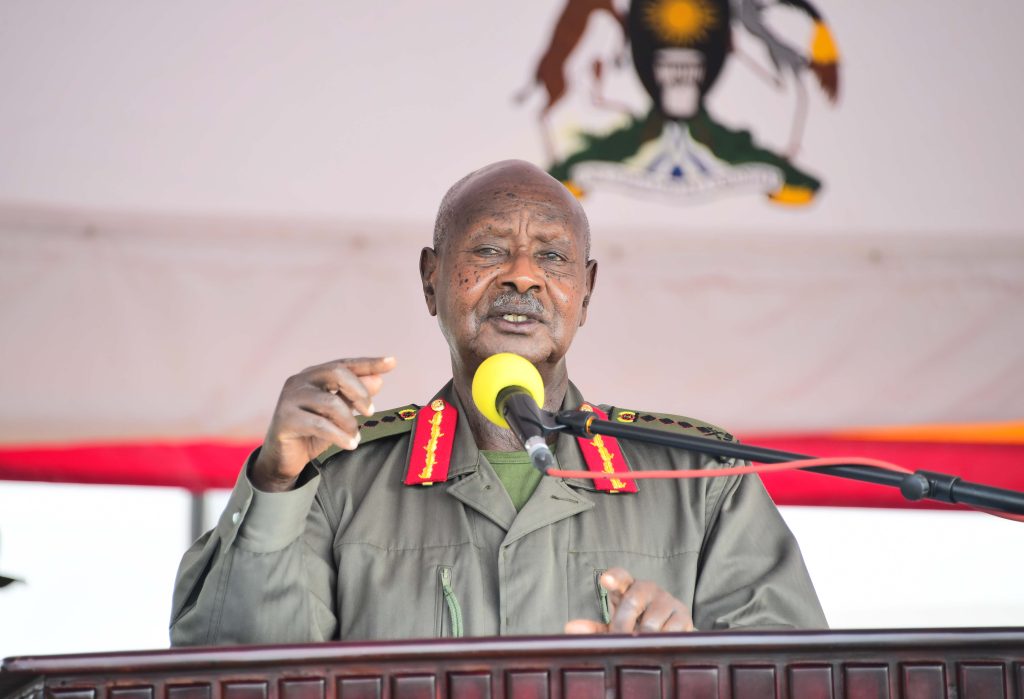By Namutebi Sumayiua
President Yoweri Kaguta Museveni, also the National chairman of the National Resistance Movement (NRM), has voiced strong concerns about the pervasive issue of corruption in Uganda, underscoring the massive financial toll it takes on the nation.

According to President Museveni, the Inspector General of Government (IGG) estimates that the country loses approximately Shs9.7 trillion annually due to corruption.
“This is not acceptable; corruption should be crushed and will be crushed,” the President declared during his keynote speech on the National Resistance Movement’s commitment to improving the quality of life for Ugandans.
President Museveni made the remarks today during the opening ceremony of the Public Service Leaders’ Introspection Retreat at the National Leadership Institute (NALI) in Kyankwanzi.
The 7-day retreat which is running under the theme: “Answering the Citizens’ Call: Improved Service Delivery for Socio-Economic Transformation”, is being attended by Ministers, Permanent Secretaries and the members of the NRM Central Executive Committee (CEC).
Emphasising the historical roots and enduring nature of corruption, President Museveni recounted anecdotes from his childhood, illustrating how endemic corruption was before the NRM leadership.
“Before the advent of the NRM leadership, corruption was endemic in Uganda, both during the time of the British and afterwards,” he noted.
The President drew a stark contrast between the pre-NRM era and the measures his administration has taken to combat corruption. He cited the discipline enforced within the NRA (National Resistance Army), where misconduct was severely punished.
“When the NRA came on the scene, all this misconduct stopped,” he stated, highlighting the public execution of those who committed atrocities against the wananchi, such as the notorious Zaburoni. He said this was done in order to maintain discipline and integrity within the army.
Despite these efforts, President Museveni acknowledged that corruption persists, particularly among those in charge of government funds, procurement, and personnel.
He pointed to a dual nature of corruption: the stealing of government money and employee disloyalty in private companies.
“To address the ongoing corruption, President Museveni announced the establishment of several new initiatives, including a tax investigation unit and an accountancy and audit unit. These units will focus on investigating tax evasions, under-declarations, and money diversion.
“We are coming in indirectly,” he said, emphasising that political leaders must step in when accounting officers fail to perform their duties.
He also stressed the importance of empowering the people to defend their interests through leadership structures though he questioned their effectiveness in curbing corruption.
President Museveni highlighted the role of the judiciary in supporting anti-corruption efforts, calling for no bail for those accused of serious crimes, including corruption.
“The only support we need from the Judiciary is no bail for those accused of murder, treason, terrorism, rape, defilement, corruption (embezzlement), and village thefts,” he asserted.
The President reiterated his commitment to defeating corruption, linking it to broader national goals such as security, healthcare, education, and economic integration.
“Once we deal with the corruption, we, then, have the other elements of the mass-line that I talked about at Kololo recently, different from the elite-line. Apart from security for all, we insisted on immunisation for all and health care for all; education for all (UPE and USE); prosperity for all; clean water for all; infrastructure development; and continental and regional economic integration for the market of our wealth products. With these, we cannot go wrong,” he affirmed.
The Vice President, H.E. Jessica Alupo highlighted Uganda’s advancements in security and economic stability under President Museveni’s leadership.
“You can now move from North to East, South to West, and Central at any time of the day without any interruptions. This is military security,” H.E Alupo stated, underscoring the nation’s improved security landscape.
On the economic front, she praised the enduring stability achieved since 1986.
“Economic security speaks for itself; Your Excellency, you have provided economic stability from 1986 up to now,” the Vice President emphasised, acknowledging President Museveni’s pivotal role in fostering a stable and secure Uganda.
The Prime Minister of Uganda, Rt. Hon. Robinah Nabbanja, also expressed her gratitude and admiration for President Museveni’s leadership, which has steered Uganda towards significant development milestones.
“Allow me to thank you, Your Excellency, for your vision, wisdom, and strategic leadership that has propelled Uganda from the ranks of the least developed countries to lower middle-income status,” the Prime Minister remarked.
She affirmed her office’s commitment to coordinating with all other Ministries, Departments, and Agencies (MDAs) to ensure the successful implementation of the government’s ambitious operational strategy aimed at fostering a public service culture that supports tenfold economic growth.
Rt. Hon. Nabbanja also welcomed President Museveni back from the thanksgiving ceremony at Kololo, where the achievements of the National Resistance Movement government were celebrated.
“We saw that Ugandans appreciate the NRM government’s performance,” she noted.
Addressing project delays, Rt. Hon. Nabbanja highlighted that design reviews across MDAs have contributed to the slow implementation and completion of projects.
“I have brought this to the attention of all ministers and accounting officers,” she stated.
Additionally, she expressed gratitude for the progress in safe water coverage, reporting that it stands at 65% in rural areas and 70% in urban regions, with the exception of the Karamoja sub-region.
On her part, the Head of Public Service and Secretary to Cabinet, Ms. Lucy Nakyobe, also extended her deepest gratitude to President Museveni for his visionary leadership and unwavering dedication to Uganda’s development.
“Your commitment to enhancing the lives of our people through strategic initiatives and policies provides the foundation upon which we build our efforts,” she stated.
She also emphasised the critical role of Ministers and Permanent Secretaries in improving service delivery.
“Your presence here signifies the collective resolve to introspect, evaluate, and strategize for better service delivery. Your expertise and leadership are vital in steering our ministries and departments towards achieving our shared goals,” she said.
Ms. Nakyobe also acknowledged the valuable contributions of Party Executive Leaders.
“Your role in shaping our political landscape and guiding policy implementation is crucial. Your insights and support are invaluable,” she noted.
Ms. Nakyobe stressed the importance of responding to the needs and aspirations of Ugandan citizens, underscoring that improved service delivery is a necessity for the nation’s progress and prosperity.
“The citizens of Uganda have voiced their needs and aspirations, and it is our duty to respond effectively and efficiently,” she added.
Reflecting on the significance of the Introspection Retreat, Ms. Nakyobe said, “This retreat is a pivotal moment for us as the top leadership of Uganda’s public service. Our collective presence here signifies our commitment to critically assess our performance and to chart a path toward improved service delivery for the citizens of Uganda.”
She acknowledged the persistent challenges in public service delivery, including inefficiency, bureaucratic delays, inadequate resource allocation, and lack of accountability.
“Despite our concerted efforts and the strides, we have made, it is undeniable that significant challenges persist in our public service delivery,” she said.
“The root cause of poor service delivery is a lack of understanding of the job we are in, failure to work together, and lack of commitment and accountability to the public,” she explained.
Ms. Nakyobe called for strong ethical leadership, effective policy implementation, prudent resource management, and investment in human capital to transform Uganda’s public service.
“Through strong ethical leadership, effective policy implementation, prudent resource management, investment in our human capital, and focusing on our citizens, we can transform our public service into a model of efficiency and effectiveness,” she declared.



